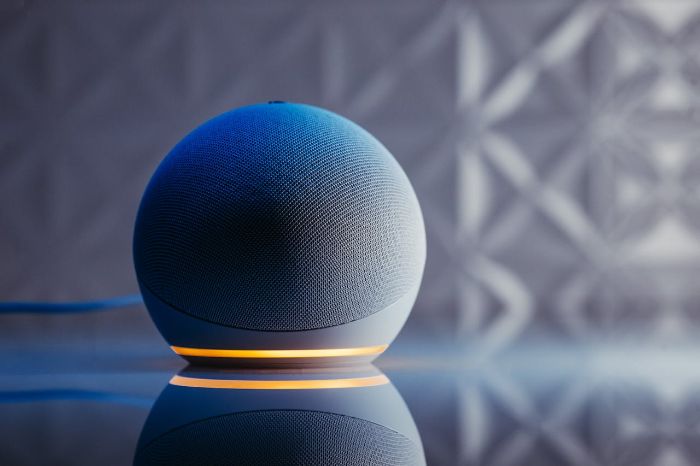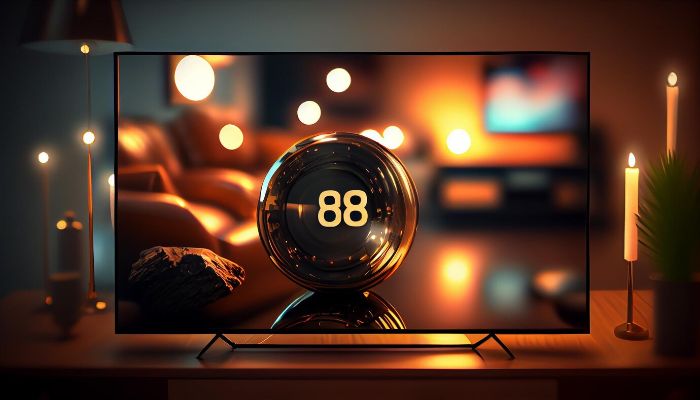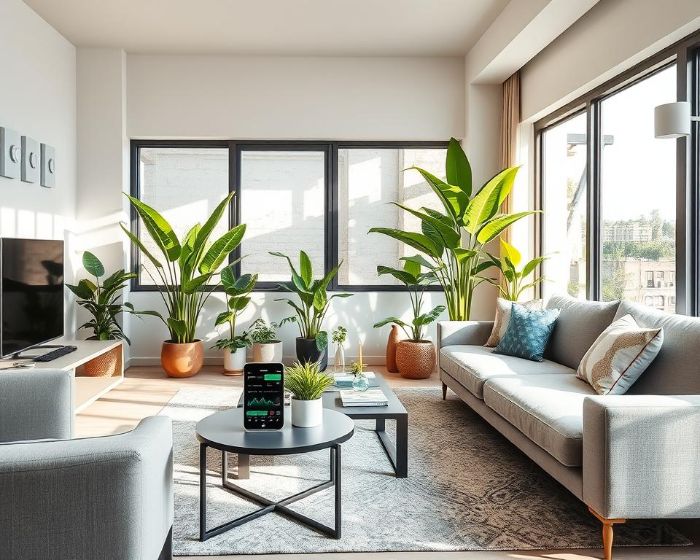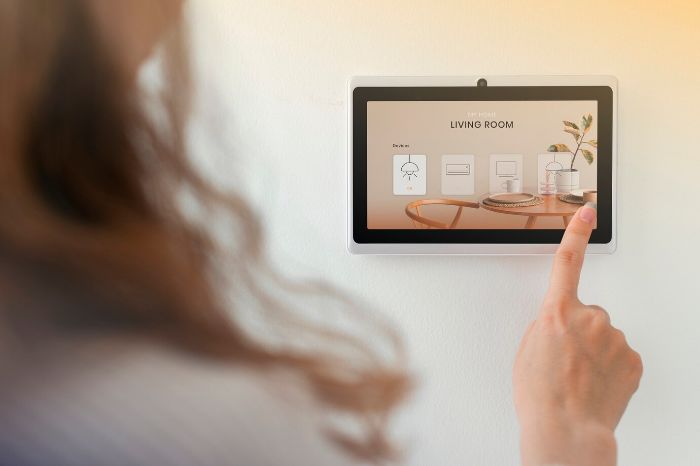Have you ever thought about how voice-activated speakers change home audio? These devices are more than a trend. They’re changing how we hear sound at home.
Smart speakers have quickly become popular. They beat old audio systems because they’re easy to use. They work well with other smart home gadgets and have cool voice tech.
Amazon’s Alexa, Google Assistant, and Apple’s Siri are leading the charge. They make our homes smarter. We can control music and lights just by talking.
This tech is getting better all the time. It’s making home audio smarter, easier, and more personal.
Key Takeaways
- Smart speakers have overtaken traditional audio systems in popularity for music, radio, and podcasts.
- Voice control provides a natural and convenient experience for users.
- These devices allow for instant information access and control of various home functions.
- Smart speakers integrate seamlessly with other devices to create an automated home ecosystem.
- The use of voice-activated speakers has revolutionized audio consumption in modern homes.
- Popular voice assistants include Amazon’s Alexa, Google Assistant, and Apple’s Siri.
- The Sonos Era 100 and Amazon Echo (4th Gen) are highly rated options recommended for audio enthusiasts.
Table of Contents
The Rise of Voice-Activated Speakers in Home Audio
Voice-activated speakers have changed how we listen to music at home. The quick growth of smart speakers is thanks to big steps in voice tech. These devices started as simple music players but now are key parts of smart homes.
How Voice Technology Has Evolved in Audio Systems
The start of voice tech had big limits. The first voice assistant in 1990 was very expensive and not very useful. Now, these systems can understand almost all of what we say in U.S. English.
After the Amazon Echo came out in 2015, more people started using smart speakers. This made voice tech even better. Now, these devices can control our homes and keep our schedules.
Why Voice-Activated Speakers Are So Popular in Modern Homes
People love these devices because they are easy to use and save time. Users enjoy not having to touch anything to control their music. Smart speaker fans listen to music for almost five hours every day.
These devices are great for streaming music and shows. In fact, 91% of users listen to something on them every month. It’s clear that smart speakers are changing how we use technology at home.
Key Features of Voice-Activated Speakers
Voice-activated speakers are now common in homes. They offer many features that make life easier. Hands-free use and music streaming are key benefits.
Hands-Free Control for Effortless Interaction
Smart speakers let you use them without touching buttons. This is great for busy homes. You can play music, search, or control smart home devices with just your voice.
Integration with Streaming Services for Endless Music Choices
Music streaming is a big plus of smart speakers. They connect to Spotify, Apple Music, and YouTube Music. This means endless songs and playlists at your fingertips.
Personalized Listening Experiences
Voice-activated speakers have changed how we listen to music. They offer personalized audio experiences. Users can create custom playlists based on mood and occasions.
This lets listeners enjoy their favorite tracks easily. Whether it’s relaxing tunes or music for exercise, it’s all available.
Creating Custom Playlists and Mood-Based Playbacks
Music streaming services like Spotify and Apple Music let users make custom playlists. This makes listening more dynamic and fun. It also gives users automatic recommendations based on their listening habits.
Users can explore many genres and artists. This means there’s always something new to listen to, perfect for any moment.
Setting Up Multi-User Profiles for Tailored Recommendations
Multi-user profiles make personalization even better. They let different family members have their own accounts on shared devices. This way, everyone gets music that fits their taste.
Families can enjoy music without getting in each other’s way. It makes everyone happy with their own music experience.
Smart Home Integration with Voice-Activated Speakers
Voice-activated speakers are changing how we interact with our homes. They are key for smart home integration. Users can connect smart devices like lights, thermostats, and security systems easily.
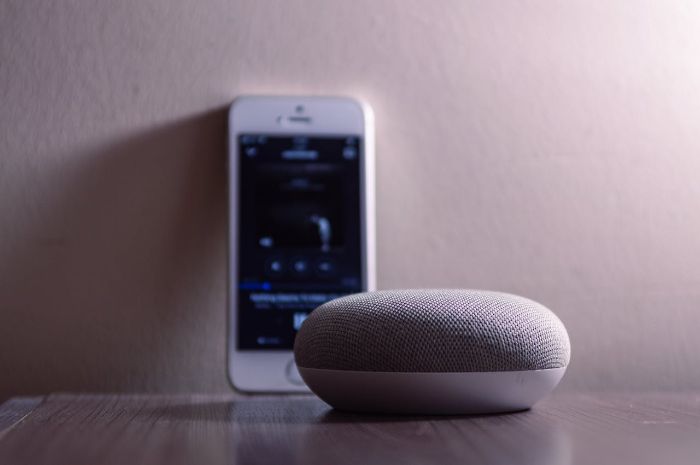
This makes our living spaces more automated. It changes our daily experiences, making things easier with simple commands.
Linking with Smart Home Devices for Full Automation
By linking voice-activated speakers with smart home devices, users get more control. A wide range of functions can be done with one device. This includes adjusting temperatures, turning on lights, or locking doors with voice commands.
This makes daily routines more enjoyable and convenient. It’s all about easy voice interactions.
Using Voice Commands to Control Other Audio and Visual Equipment
Voice commands also control audio and visual equipment. Users can manage home theater systems or stream music easily. This is great for everyone, from casual listeners to audiophiles.
It offers a hands-free way to enjoy audio and visual experiences. Voice-activated speakers make entertainment systems fit personal tastes.

Advantages of Voice-Activated Speakers Over Traditional Audio Systems
Voice-activated speakers are becoming more popular in homes. They offer many benefits over old audio systems. One big plus is their use of adaptive sound technology. This makes the sound better and more fun to listen to.
Users also like how they can make the speakers work just for them. This fits their own music and sound tastes.
Adaptive Sound Technology for Improved Audio Quality
Adaptive sound tech lets smart speakers change the sound based on where they are. This means better sound quality, whether it’s a quiet night or a party. They can make the sound clear and strong, making music and podcasts sound great.
Personalized Voice Commands and Preferences
Voice-activated speakers also let you set your own voice commands. This makes using them easy and fun. You can quickly find your favorite music, radio, and podcasts.
Many people think smart speakers are better than Bluetooth speakers. They offer more convenience and cool features.
Privacy and Security in Voice-Activated Speakers
Voice-activated speakers are getting more popular in homes across the United States. This raises big privacy concerns. It’s important to manage voice data well to keep user interactions safe. Knowing how to spot and fix security issues helps keep your privacy safe.
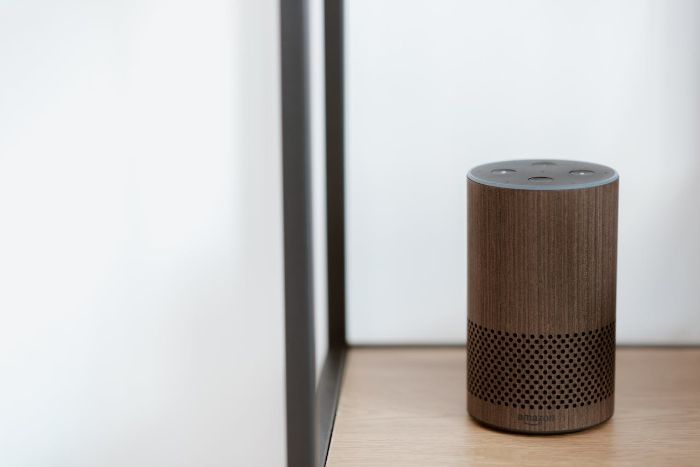
Managing Voice Data and Privacy Settings
To ease privacy worries, users need to handle their voice data carefully. Here are some steps:
- Check and change privacy settings often to control data storage.
- Remove old voice recordings to cut down on data kept.
- Use “guest mode” to keep your voice data private.
Many people worry about their voice data being used. They check and change their privacy settings often. It’s smart to set up strong passwords and use multi-factor authentication to protect your device.
Choosing Speakers with Enhanced Security Features
It’s key to pick voice-activated speakers with strong security. Look for these features:
- Speakers that can fight off hacking attempts.
- Manufacturers like Amazon and Google that update often to fix bugs.
- Good account management to stop unauthorized use.
Choose speakers with clear privacy policies and strong encryption. This lets you control your data privacy. As more families use smart speakers, knowing about privacy and security is crucial for a good listening experience.
Future Trends in Voice-Activated Audio Technology
The world of voice-activated audio tech is changing fast. It’s moving towards better AI and more personal experiences. With 35% of U.S. adults having smart speakers, AI is making devices smarter.
These changes will make talking to devices easier. Users will have smoother conversations with their speakers.
Enhanced AI for Smarter, More Responsive Speakers
Machine learning is getting better, making speakers understand us better. Soon, speakers will know what we like and adapt to our surroundings. This will make listening to music and sounds more fun.
More people will want these features as they see how useful and fun smart speakers are. They make daily life easier and more entertaining.
New Innovations for Even More Personalized Audio Experiences
New startups are using AI and data to create custom audio experiences. This means brands can offer unique audio therapies and mixes. It’s a way to make customers happier and more engaged.
Over 50% of smart speaker owners want updates on deals. This shows how important voice search and personalized content are. Voice-activated speakers are becoming key in how we enjoy audio today.
FAQ
What are voice-activated speakers?
Voice-activated speakers are smart devices. They let users talk to them to play music, control smart homes, and get info.
How do voice-activated speakers enhance home automation?
These speakers act as smart home hubs. They let users control devices like lights and thermostats with voice commands.
Which brands are leading in the voice-activated speaker market?
Amazon Alexa and Google Assistant lead. They work well with many smart home products and are easy to use.
Can I customize my listening experience with voice-activated speakers?
Yes, you can make playlists and get music suggestions. You can also set up profiles for different users.
What features make voice-activated speakers convenient for multitasking?
They offer hands-free control. This lets you manage tasks without touching buttons, making it easy to multitask.
How do voice-activated speakers improve audio quality?
They use adaptive sound tech. This tech adjusts sound based on your environment for better listening.
Are there privacy concerns associated with voice-activated speakers?
Yes, there are privacy worries. Users should check their privacy settings and data storage to keep their info safe.
What innovations can we expect in the future of voice-activated speakers?
Future speakers might have better AI for natural talks. They could also learn more about you for a more personal experience.






